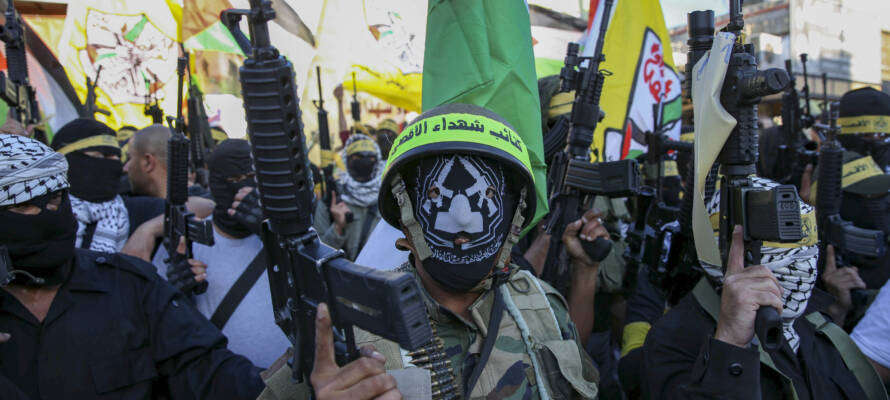Meta considers lifting ban on Arabic word “shaheed,” sparking debate over its impact on online content moderation and safety concerns.
By Rinat Harash, Honest Reporting
Picture this: Hamas leader Yahya Sinwar, the mastermind of the deadly October 7 attack on Israel, is killed. Arabic Facebook feeds are filled with posts showing Hamas flags and terrorists with AK-47s at his funeral, and the captions read: “Thousands mourn the shaheed [martyr] Yahya Sinwar.”
In a few months, such sickening posts may be considered neutral content across the social media platforms of Meta, which owns Facebook and Instagram.
That’s because Meta’s oversight board urged the social media giant this week to lift its ban on the Arabic word “shaheed,” or “martyr” in English, suggesting the word can carry a non-glorifying meaning.
But the loaded term is commonly used in the context of Palestinian and Arab violence against Jews, in Israel or abroad.
That’s how Hezbollah’s al-Manar TV described Lebanese arch-terrorist Imad Mughniyeh, who was responsible for the bombing of Israeli and Jewish targets in Buenos Aires in the 1990s. And Iranian Press TV recently referred to the “martyrdom” of Hamas’ no.3 Marwan Issa who was killed by Israel in Gaza.
So the board’s recommendation — which Meta should outright reject — could potentially lead to the mass whitewashing of terrorism online, with dangerous ramifications for Jews’ safety worldwide.
A year ago, the oversight board announced that it had accepted a request from Meta for “a policy advisory opinion on its approach to moderating the Arabic term ‘shaheed,’ when used to refer to individuals it classifies as dangerous, including terrorists.”
Meta currently removes any posts using the word “shaheed” in reference to people it designates on its list of “dangerous organizations and individuals,” which includes members of Islamist terrorist groups like Hamas. The reason is that the company presently views the word as constituting praise for these banned entities.
In its March 26 report, the board concluded that this approach is “overbroad” and harms “freedom of expression” because the word may have neutral meanings:
The word “shaheed” is sometimes used by extremists to praise or glorify people who have died while committing violent terrorist acts. However, Meta’s response to this threat must also be guided by respect for all human rights, including freedom of expression.
Meta’s approach also fails to consider the various meanings of “shaheed,” many of which are not intended to glorify or convey approval, and lead all too often to Arabic speakers and speakers (many of them Muslim) of other languages having posts removed, without that removal serving the purposes of the Dangerous Organizations and Individuals policy.
Admittedly, the term “shaheed” is used loosely to designate not only those who died as part of a global Jihad but also innocent victims of accidents or other calamities.
That being said, legitimizing the word in the name of the latter may result in problematic scenarios pertaining to the former.
For example, if the term isn’t considered as glorifying, it can be attached to the name of Hamas leader Sinwar once he is killed, as shown above.
This may be the case if the post doesn’t include additional “signals of violence,” such as weapons. But the AK-47s in Sinwar’s example don’t matter because the report adds that “even when those signals are present, the content may still benefit from the ‘reporting on, neutrally discussing or condemning’ exceptions” — which may legitimize posts by propaganda news outlets.
Sadly, this slippery slope isn’t only linguistic. Permitting the word “shaheed” in such a context may go viral, risking the welfare of Jews in Israel and abroad, both online and offline.
When weighing freedom of expression against safety in the coming 60 days until it responds to the board, Meta should remember one simple truth: the mere fact it requested a thorough review of its policy on the word “shaheed” proves how powerful it is to millions of users.
Would the company ask for an in-depth analysis of a neutral word?
Send Passover Packages to Needy Israeli Soldiers - Bring Them Joy!
We are honored to thank the young men and women of the IDF who risk their lives every day to protect the citizens of Israel. Since October 7th, soldiers have been on the battlefield for months - many are hoping to come home for Passover.
Join us in sending Passover food packages (and personal notes) to Israeli soldiers and their families.
Many soldiers spend the Passover holiday with needy families back home. The soldiers greatly appreciate your love and concern. Bring them Passover joy!
CLICK HERE TO SEND YOUR PACKAGE AND NOTE TO ISRAELI SOLDIERS!



